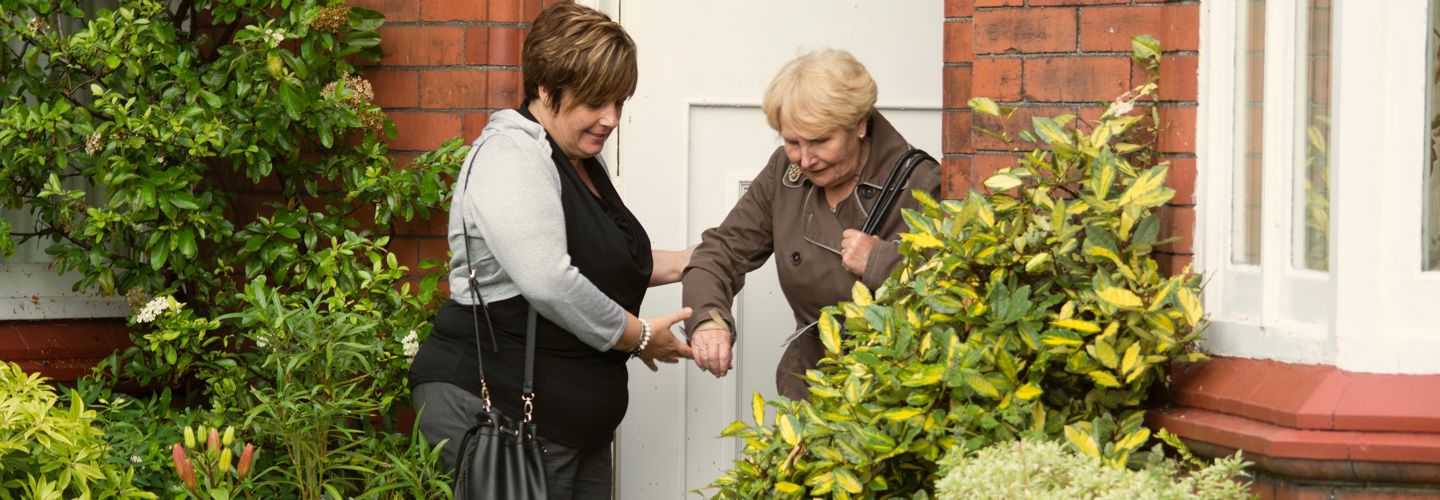
Tips on the Prevention of Falls
Our muscles and bones get weaker and less resilient as we age, increasing the likelihood of falls. The most prevalent cause of a rapid decline in independence is falling, which affects over 34% of the elderly population in the UK and costs £4.4 billion yearly.
Published: 08/12/2023
Preventing falls in and around the home
Our muscles and bones get weaker and less resilient as we age, increasing the likelihood of falls. If you or someone you care about has fallen before, regaining your confidence and avoiding new falls are both possible outcomes of little adjustments. The most prevalent cause of a rapid decline in independence is falling, which affects over 34% of the elderly population in the UK and costs £4.4 billion yearly. Falls are the leading cause of people losing their independence more quickly. 30% of those over the age of 65 and fifty percent of those over the age of 80 fall at least once a year, putting them at the highest risk of falling-related injuries.
Our mission here at Right at Home Central London is to help our clients and their families in the Central London area avoid falls occurring at home. If you are worried about the risk of falls, it’s important you speak to a healthcare professional. They take falls in elderly people very seriously, as they can have a significant impact on health and wellbeing.
Tips for preventing falls at home
You may make your house safer to prevent falls in a variety of ways, from making little adjustments to your routine to implementing bigger changes.
Here are some tips from Right at Home Central London to prevent falls at home:
Improve visibility & lighting in the home to prevent falls. Consider these options to increase visibility at home:
- Adding more lighting to the home, particularly in areas that are currently dimly lit
- Replace the yellow light bulbs with white ones and make sure you select high-wattage bulbs.
- Consider installing motion-activated lights outside the house, on the stairs and on the steps.
- Increase the lighting in the stairs to compensate for the shadows that can cause optical disorientation.
Difficulty navigating your home due to clutter might potentially increase the risk of falling. You may enhance organisation and decrease clutter in your home by ensuring you:
- Put away items that aren't used frequently in closets or cabinets.
- Make sure that storage boxes are clearly labeled.
- Adjust the length of the curtains so that they do not drag on the floor.
- Arrange the cabinets in a way that suits your daily habits. For instance, make sure cereals and other dry goods that you consume frequently are easily accessible in a cabinet.
- Clear any clutter from the home's frequently used corridors and rooms
- Make sure all corridors are broad, straight, and free of clutter
- Clean up any mess as soon as it occurs
- Put a non-slip mat that absorbs water in front of sinks, baths or showers.
Take care when you get up from chairs and out of bed
When you get up from a long period of sitting and start moving around too quickly, you could get dizziness. When you sit for an extended period of time, your muscles may stiffen up, which initially makes moving about more difficult. To combat this, ensure that you
- Proceed slowly when getting out of a chair or a bed.
- Consider chairs or couches with strong armrests and adequate back support.
- A walking stick should be readily available for you to use in order to help you stand up.
- Make sure there aren't too many pillows on the bed that might fall to the floor as you sleep.
- Keep clutter away from side tables in case you need to use them for extra support when standing
- Put your bedside lamp on before standing up to provide extra visibility
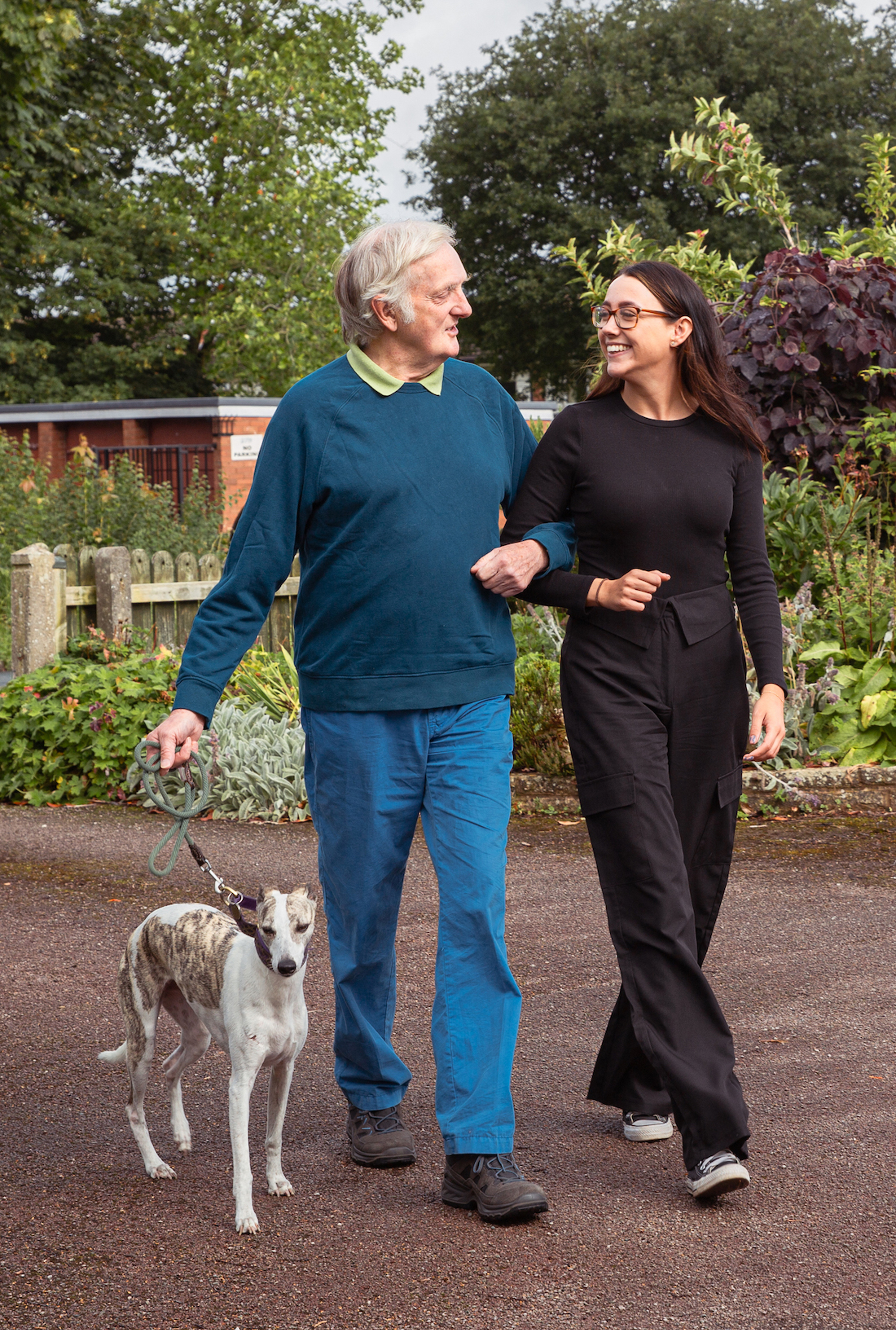
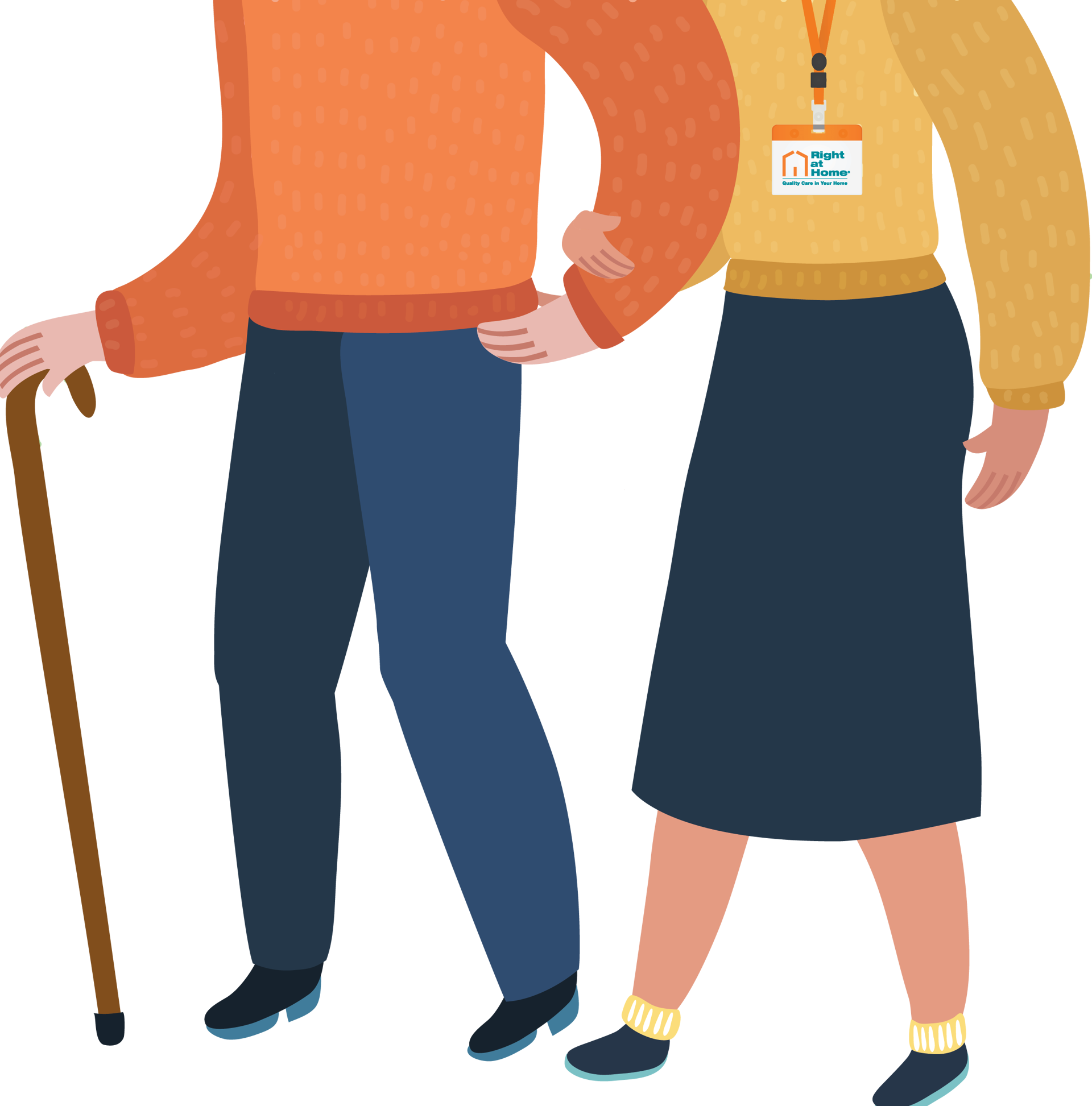
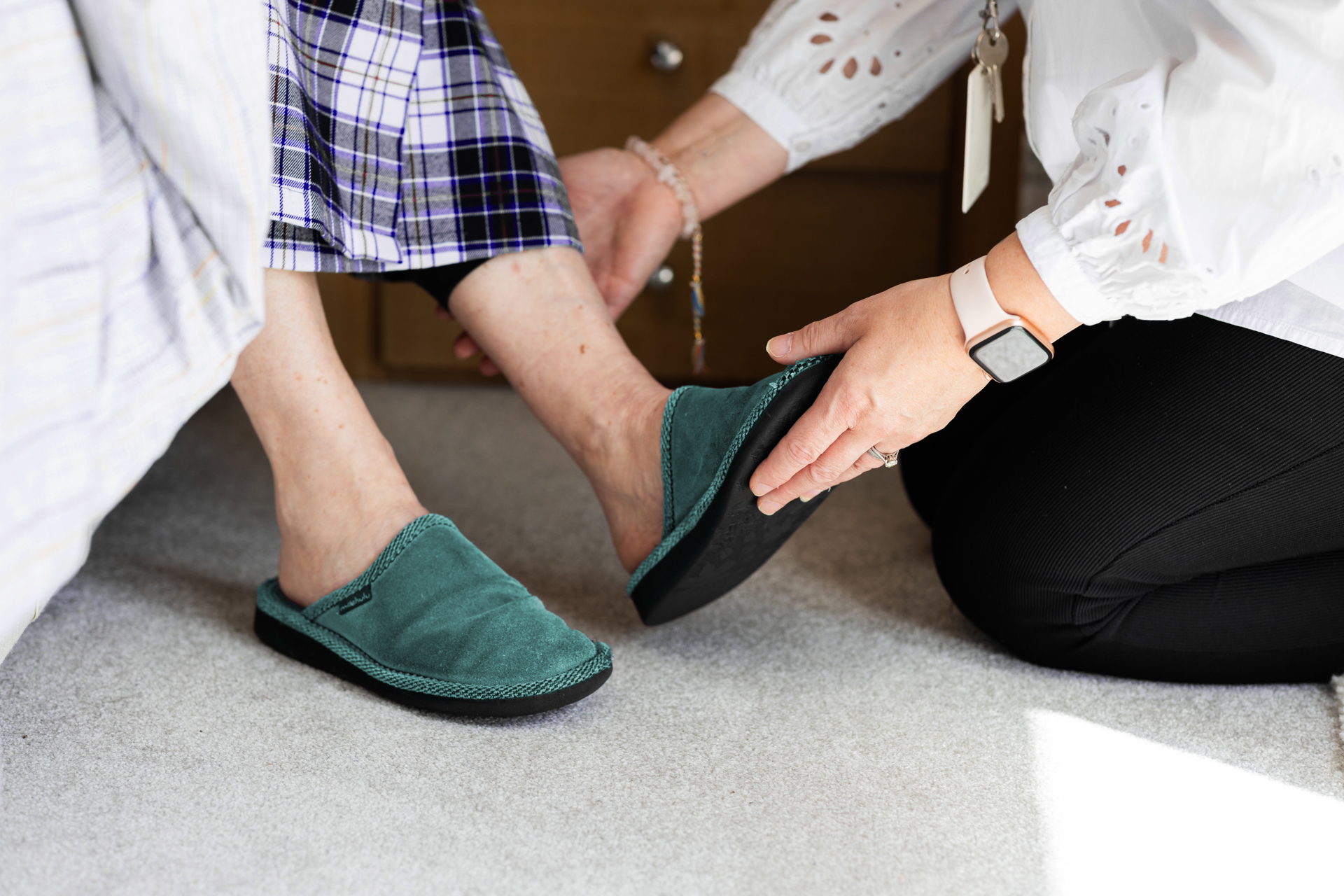
Wear well-fitting clothes and footwear
Your risk of falling might be elevated due to the shoes and clothes you're wearing. To avoid this:
- To help put shoes on easier, buy a shoe horn.
- Wear tight fitting clothes to prevent trip hazard – Right at Home Central London can recommend some local tailors to alter clothes.
- Don’t wear long jewellery or scarfs that could get caught onto items
- Buy grip or non-slip socks to prevent any falling for slipping on objects
- Ensure you buy shoes in the right size, and that they aren’t too loose.
- Ensure that your shoes have enough space for thick, fluffy socks in case the weather is cold. This ensures that your feet are able to stay warm and that blood can circulate through the feet.
- Wear slippers around the house to prevent getting cold feet. Protect yourself from slipping by ensuring you choose slippers with good grip, backs and Velcro fastenings.
- Trim your toenails regularly to ensure you maintain good podiatry.
- Visit your local chiropodist Find podiatrists and chiropodists services - NHS (www.nhs.uk) to ensure your feet remain in good health
Make your house as fall hazard free as possible
The risk of falls increase when moving around a cluttered house. To avoid tripping on objects, carpets and steps:
- Create wide, straight and clear paths with no clutter
- Move all frequently used items to eye level where possible
- Repair faulty steps and any carpets or coverings
- Install carpets or non-slip rubber threads. They are less slippery than laminate or bare steps
- Remove rugs if the room is already carpeted
- Install handrails on the sides of stairs and steps - ensure they extend beyond the top and bottom steps, are round or curved and are a contrasting colour to the wall
- Invest in bathroom doors that open outwards and avoid putting any mats in the way of the door opening
Make your pathways and steps suitable for all seasons and weather
Completing a couple simple steps in identifying hazards will keep you safe when outdoors, whether you are on a walk, gardening or simply relaxing in your yard. To prevent falls outside:
- Cover areas such as porches, steps and pathways with waterproof textured paints
- Replace steps with ramp access as required
- Install motion-sensor lighting around the outside of the house
- Add abrasive strips, rubber stair treads or bright paint to the edge of steps to enhance their visibility
- Keep steps, pavements, decking and porches free of obstacles
- Install handrails on both sides of steps. These should extend beyond the top and bottom steps so you have the right support required
- Check the curb or stair height with a walking aid before stepping up on them or down from them
- Repair loose concrete areas around the house
- Be mindful of changes in terrain. Try to stay on level ground and watch for steps, holes, uneven areas and potential obstacles in paths
- Arrange for the removal of protruding tree roots, bushes or shrubs
- Ask someone to help you to trim back bushes or plants that are overgrown
Eat healthily and exercise regularly
- As we age, it becomes increasingly important to maintain a balanced diet. A few simple changes to your diet can ensure that you become as healthy as possible, both physically and mentally.
- Check your Vitamin D levels - Being unable to get outside frequently can cause a Vitamin D deficiency due to a lack of exposure to sunlight. This can cause bones to become thin, brittle, weak or misshapen. Talk to your GP about Vitamin D supplements which can be a simple solution.
- Increase fluid intake - There are multiple reasons why the elderly may become dehydrated, such as forgetting to drink enough or not feeling thirsty. Keeping a water bottle with you throughout the day can be a gentle reminder to drink more water. Try alternating your beverages between water, flavoured water or dilutes if you struggle to keep up with your water intake
- Eat more protein - Protein helps build muscle and keep muscles strong, but it can be difficult to get enough protein in your diet. Take a look at the NHS website which contains plenty of information on how you can integrate more protein into a healthy, balanced diet
- Exercise regularly - engaging in regular physical activity helps improve your strength and balance. You don’t have to run a mile every day - try activities such as walking or some short exercise programmes such as 10 minute pilates or chair yoga. These are great exercises to improve muscle strength and reduce the risk of falling
You can find lots more information about what a balanced diet looks like on the NHS website
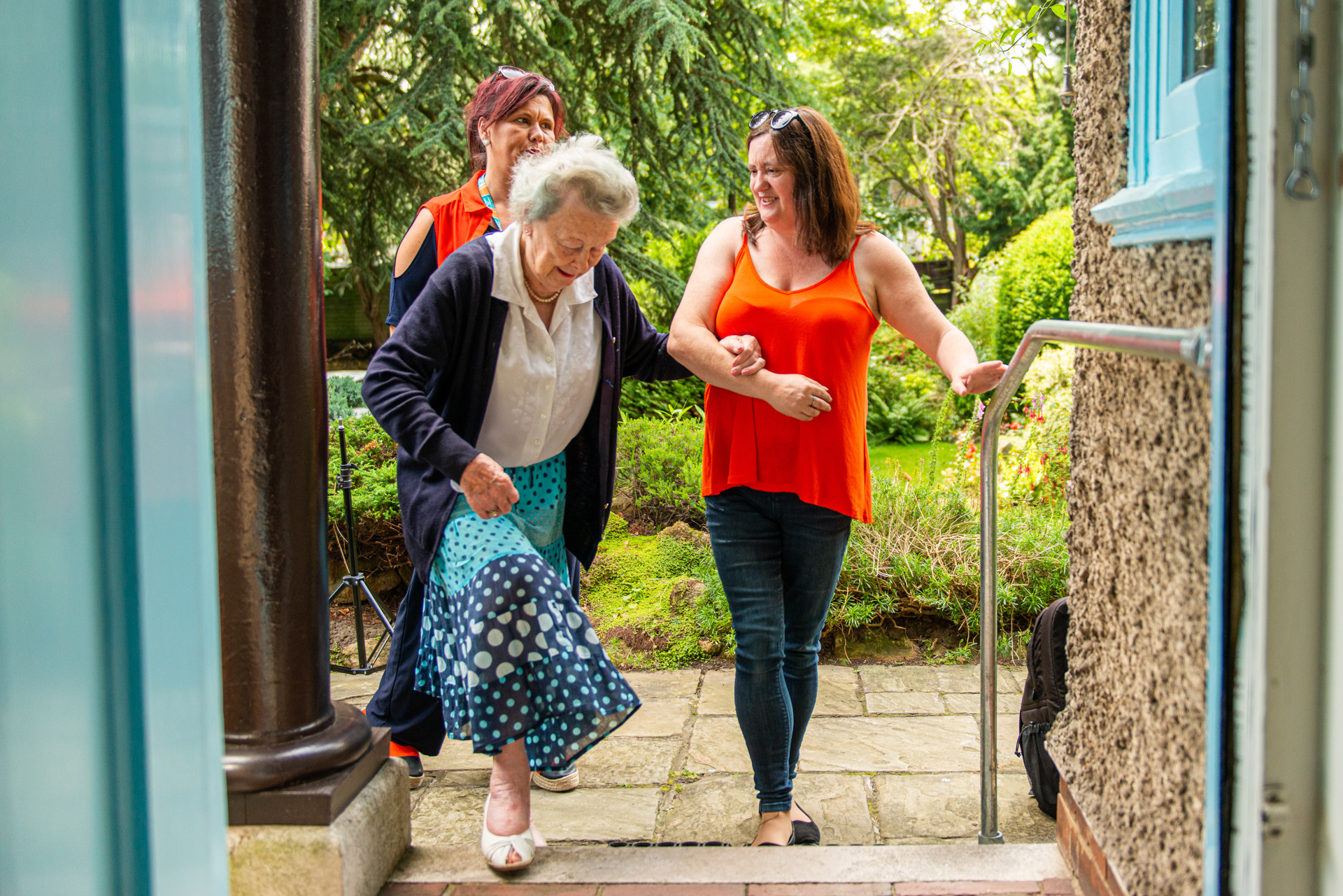
How can Right at Home Central London assist with prevention of falls at home?
Here at Right at Home Central London, as part of our initial care assessment, we carry out a risk assessment. This assessment is to mitigate risks and make recommendations that can support the safety of our Clients living at home, as well as understand how best our team of CareGivers can support you. For further advice on preventing falls in the home, room-by-room, download our falls prevention guide.
For more information about our care services or to book a homecare assessment, contact us today on 020 3048 7333.
